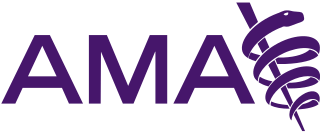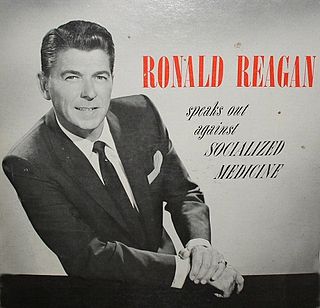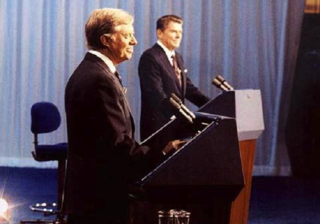Socialized medicine is a term used in the United States to describe and discuss systems of universal health care—medical and hospital care for all by means of government regulation of health care and subsidies derived from taxation. Because of historically negative associations with socialism in American culture, the term is usually used pejoratively in American political discourse. The term was first widely used in the United States by advocates of the American Medical Association in opposition to President Harry S. Truman's 1947 health care initiative. It was later used in opposition to Medicare. The Affordable Care Act has been described in terms of socialized medicine, but the act's objective is rather socialized insurance, not government ownership of hospitals and other facilities as is common in other nations.

The American Medical Association (AMA) is an American professional association and lobbying group of physicians and medical students. This medical association was founded in 1847 and is headquartered in Chicago, Illinois. Membership was 271,660 in 2022.

The Medicare Prescription Drug, Improvement, and Modernization Act, also called the Medicare Modernization Act or MMA, is a federal law of the United States, enacted in 2003. It produced the largest overhaul of Medicare in the public health program's 38-year history.

Fortney Hillman "Pete" Stark Jr. was an American businessman and politician who was a member of the United States House of Representatives from 1973 to 2013. A Democrat from California, Stark's district—California's 13th congressional district during his last two decades in Congress—was in southwestern Alameda County and included Alameda, Union City, Hayward, Newark, San Leandro, San Lorenzo, and Fremont, as well as parts of Oakland and Pleasanton. At the time he left office in 2013, he was the fifth most senior Representative, as well as sixth most senior member of Congress overall. He was also the dean of California's 53-member Congressional delegation, and the only openly atheist member of Congress.

The Children's Health Insurance Program (CHIP) – formerly known as the State Children's Health Insurance Program (SCHIP) – is a program administered by the United States Department of Health and Human Services that provides matching funds to states for health insurance to families with children. The program was designed to cover uninsured children in families with incomes that are modest but too high to qualify for Medicaid. The program was passed into law as part of the Balanced Budget Act of 1997, and the statutory authority for CHIP is under title XXI of the Social Security Act.
Single-payer healthcare is a type of universal healthcare, in which the costs of essential healthcare for all residents are covered by a single public system. Single-payer systems may contract for healthcare services from private organizations or may own and employ healthcare resources and personnel. "Single-payer" describes the mechanism by which healthcare is paid for by a single public authority, not a private authority, nor a mix of both.

The Social Security Amendments of 1965, Pub. L. 89–97, 79 Stat. 286, enacted July 30, 1965, was legislation in the United States whose most important provisions resulted in creation of two programs: Medicare and Medicaid. The legislation initially provided federal health insurance for the elderly and for financially challenged families.

Operation Coffee Cup was a campaign conducted by the American Medical Association (AMA) during the late 1950s and early 1960s in opposition to the Democrats' plans to extend Social Security to include health insurance for the elderly, later known as Medicare. As part of the plan, doctors' wives would organize coffee meetings in an attempt to convince acquaintances to write letters to Congress opposing the program. The operation received support from Ronald Reagan, who in 1961 produced the LP record Ronald Reagan Speaks Out Against Socialized Medicine for the AMA, outlining arguments against what he called socialized medicine. This record would be played at the coffee meetings.

The Alliance for Retired Americans (ARA) is a 501(c)(4) non-profit organization and nonpartisan organization of retired trade union members affiliated with the AFL-CIO, which founded it in 2001. The group's membership also includes non-union, community-based activists. Its predecessor organization was known as the National Council of Senior Citizens (NCSC).
Nelson Hale Cruikshank was known nationally in the United States as an expert on Social Security, Medicare and policy on aging. He was a Methodist minister, labor union activist and the first director of the Department of Social Security at the AFL–CIO before entering government service in his mid-60s.
This article lists the healthcare statements of some candidates for president during the 2008 US presidential election.
The Saskatchewan doctors' strike was a 23-day labour action exercised by medical doctors in 1962 in the Canadian province of Saskatchewan in an attempt to force the Co-operative Commonwealth Federation government of Saskatchewan to drop its program of universal medical insurance. The strike was from July 1, the day the Saskatchewan Medical Care Insurance Act took force, to July 23.
Ronald Reagan was the 40th president of the United States from 1981 to 1989. Previously, he was the 33rd governor of California from 1967 to 1975 and acted in Hollywood films from 1937 to 1964, the same year he energized the American conservative movement. Reagan's basic foreign policy was to equal and surpass the Soviet Union in military strength, and put it on the road to what he called "the ash heap of history". By 1985, he began to cooperate closely with Soviet leader Mikhail Gorbachev, with whom he became friends and negotiated large-scale disarmament projects. The Cold War was fading away and suddenly ended as the Soviets lost control of Eastern Europe almost overnight in October 1989, nine months after Reagan was replaced in the White House by his vice president, George H. W. Bush, who was following Reagan's policies. The dissolution of the Soviet Union took place in December 1991. In terms of the Reagan Doctrine, he promoted military, financial, and diplomatic support for anti-communist insurgencies in Afghanistan, Nicaragua, and numerous other countries. For the most part, local communist power collapsed when the Soviet Union collapsed.

"There you go again" was a phrase spoken during the second presidential debate of 1980 by Republican presidential candidate Ronald Reagan to his Democratic opponent, incumbent President Jimmy Carter. Reagan would use the line in a few debates over the years, always in a way intended to disarm his opponent.
Edward R. Annis was a Florida surgeon who served as president of the American Medical Association and as president of the World Medical Association. He was one of the most foremost critics of the United States Medicare program.
The history of health care reform in the United States has spanned many decades with health care reform having been the subject of political debate since the early part of the 20th century. Recent reforms remain an active political issue. Alternative reform proposals were offered by both of the major candidates in the 2008, 2016, and 2020 presidential elections.
The healthcare reform debate in the United States has been a political issue focusing upon increasing medical coverage, decreasing costs, insurance reform, and the philosophy of its provision, funding, and government involvement.
The public health insurance option, also known as the public insurance option or the public option, is a proposal to create a government-run health insurance agency that would compete with other private health insurance companies within the United States. The public option is not the same as publicly funded health care, but was proposed as an alternative health insurance plan offered by the government. The public option was initially proposed for the Patient Protection and Affordable Care Act, but was removed after the independent US senator for Connecticut Joe Lieberman threatened a filibuster.

The Affordable Care Act (ACA), formally known as the Patient Protection and Affordable Care Act (PPACA) and informally as Obamacare, is a landmark U.S. federal statute enacted by the 111th United States Congress and signed into law by President Barack Obama on March 23, 2010. Together with the Health Care and Education Reconciliation Act of 2010 amendment, it represents the U.S. healthcare system's most significant regulatory overhaul and expansion of coverage since the enactment of Medicare and Medicaid in 1965. Most of the act's provisions are still in effect.
The Independent Payment Advisory Board (IPAB) was to be a fifteen-member United States government agency created in 2010 by sections 3403 and 10320 of the Patient Protection and Affordable Care Act which was to have the explicit task of achieving specified savings in Medicare without affecting coverage or quality. Under previous and current law, changes to Medicare payment rates and program rules are recommended by MedPAC but require an act of Congress to take effect. The system creating IPAB granted IPAB the authority to make changes to the Medicare program with the Congress being given the power to overrule the agency's decisions through supermajority vote. The Bipartisan Budget Act of 2018 repealed IPAB before it could take effect.









